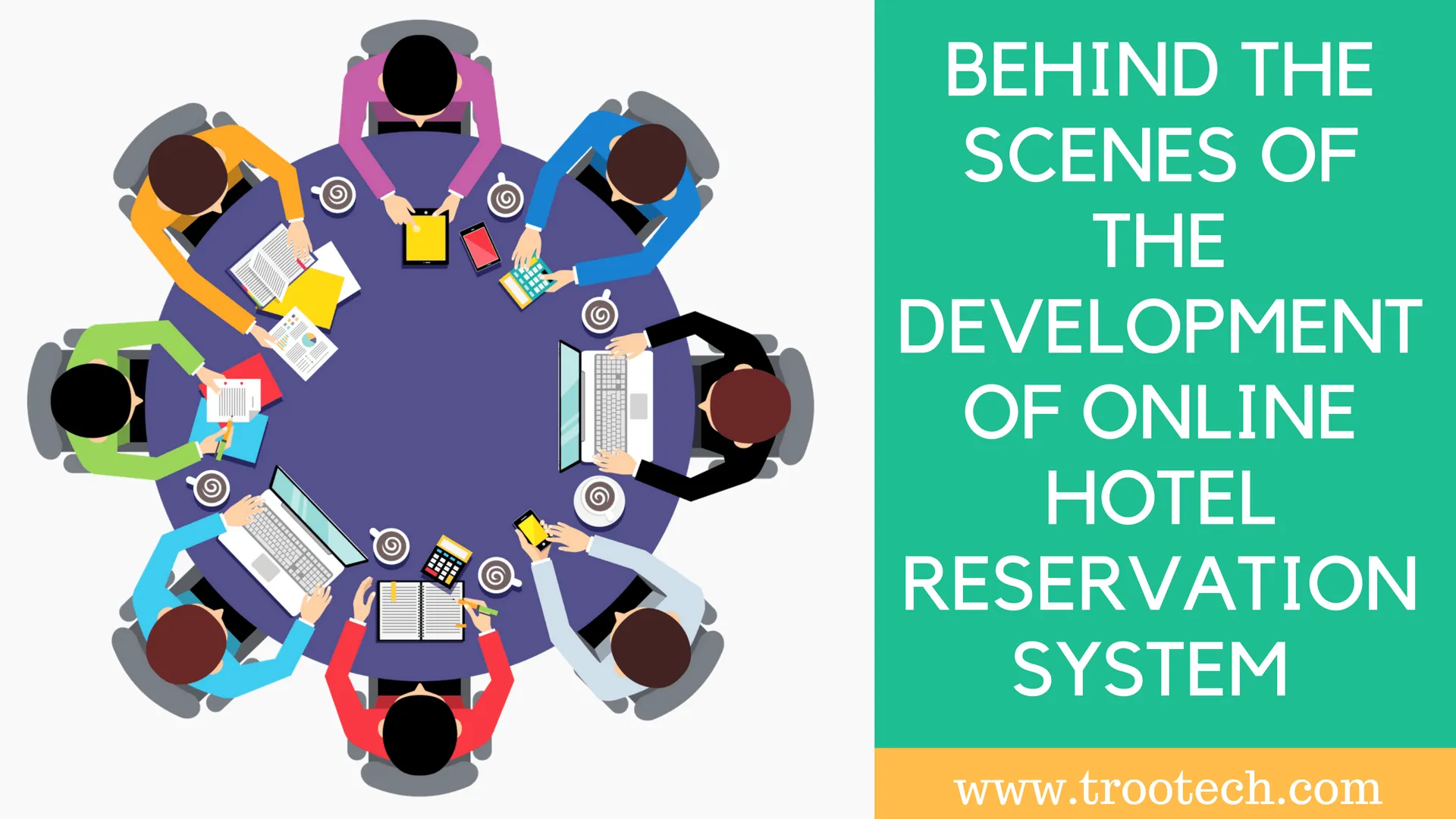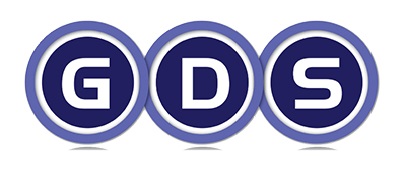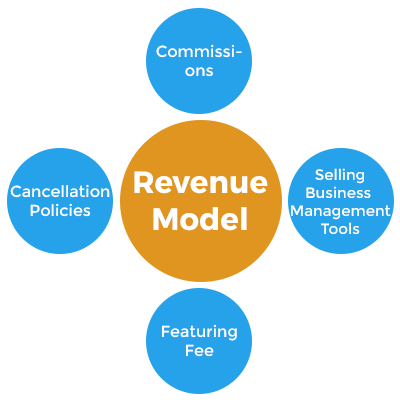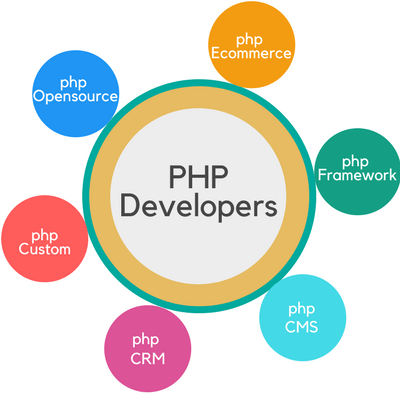How We Sail Through The Development Process Of Online Hotel Reservation System

Considering the popularity of online hotel reservation system and having delivered top-notch custom-tailored website development, Android mobile app development, and iOS mobile app development; we, at TRooTech gave it a thought to put forward the entire process and the resources that are involved in the development of a fully-functional online hotel reservation web portal for you.
With so many development firms to choose from, with variations in the pricing structure of the budget, the implementation of the functionality, and the ambiguity in the time provided; it is important for at least one of us to step forward and show the real scenario behind the development of a feature-rich web portal.
And TRooTech took the initiative!
Have a look at what difficulty and challenges we readily embraced, in order to deliver a web portal that provides your customers with the ease of booking a room without going through any hassle.
Online Hotel Reservation System: An Overview
—————–
The most important module of a hotel reservation system is the search and browsing functionality.
This requires a rich database that consists of all the information related to the hotel rooms, bifurcations in type of rooms, amenities in each room, their pricing, their structure, cancellation policies, and type of the database architecture to be developed.
There are instances when the cancellation policies and other varying factors are to be added dynamically into the web portal, owing to the needs of the client or as a way to enhance the portal compared to the contemporaries.
This means that the cancellation policies of all the hotels are to be listed, analyzed, categorized and then on the basis of what the cancellation policy of a particular hotel is, the customers are charged accordingly.
This even varies the refund eligibility, the percentage of the refund, no refund policy situations, and the number of the days within which the deposited amount is refunded back to the travelers’ account.
There are two ways to manage the cancellation policy:
- GDS System
- Custom Inventory
Global Distribution System

When the varying factors are to be customized and changed, as and when the hoteliers reassess their policies, GDS is the best solution for storing and extracting the hotel data.
Global Distribution System holds no inventory, in fact the inventory is held on the admin’s reservation system itself.
A GDS has a real-time link to the admin’s database which helps the admin to define the current policy and penalize the travelers accordingly.
Advantages of using GDS:
- Instant update on room rates & availability can be shared real-time via GDS network.
- Manual checks and updates are eliminated as all the bookings are available on the dashboard.
- All the types of users get access to their customized data, whether it is room rates, photos, discounts or availability.
Custom Inventory
Custom inventory on the other hand, is among the most significant sources of revenue for the company.
A custom inventory is a shelf application which can be operated from multiple locations.
Herein, all the data, changes, updates in the system is to be manually updated into the system. Such pre-built software application is to meet the overall functionality, ease of adaptability, multiple language support, etc.
The custom inventory is much more reliable for the data entries and is a powerful revenue generation tool for the booking portals as for every listing they make, they make money.
The choice of which relies completely upon our clients as per the scalability they envision about their business. If you want to learn more about the cancellation policies of the big hotel booking brands, have a read here:
More About Cancellation Policy Of Hotel Booking Businesses
Possible Revenue Models for Online Hotel Reservation System
—————–

Being a vast business and a lucrative one, online hotel reservation system has many aspects to add in the revenue model for boosting the revenue generation.
· Commissions
In this type of revenue model, the admin charges a certain amount of service commission fee from the travelers and a certain amount of transaction fee from the hoteliers.
This requires the development of a wallet for the platform with the help of PCI compliance, third-party APIs, and payment gateways.
· Cancellation Policies
The cancellation policy in most of the cases is to be charged from both the travelers and hoteliers in either case when they both cancel.
In case when the traveler cancels the booking, the admin of the website portal charges a certain amount of cancellation fee either as specified by the hotelier or by the unit model designed by the portal itself.
In case when the hotelier cancels the booking, the admin refunds the complete amount deposited by the traveler and charges a certain amount of cancellation fee from the hotelier.
· Selling Business Management Tools
In many cases, the admin provides certain business management tools to the hoteliers so that their room gets accommodated at most times.
For the ease of management that the platform provides, it charges a certain amount in the form of a subscription fee on a monthly basis from the hoteliers.
If this is the case, the associated tools are also to be developed which looks after the integration of the different hotel websites, acceptance of booking of rooms, booking a room on the hotel website, guest profiles, notes, and tags, shift planning and management tools, for planning the acquisition and retention of the customers.
· Featuring Fee
In this type of revenue model, the hotels are charged for the listing and featuring on the online hotel booking website portal. There can be many parameters that can be considered while charging the featuring fees to any restaurant.
The restaurants can be charged an extra fee for being featured in the OpenTable’s dining guide, on a monthly basis apart from the basic software installation and management fee.
Other Functionalities to Be Developed
- Search and Browse options on the basis of the amenities, dates, prices, etc.
- Prices based on the different room types and groups can be created.
- Display of hotel room images, per day cost, availability details, and amenities.
- Managing the reviews and ratings provided by the customers for their shared experience.
- A well-structured calendar that displays the number of booked and vacant rooms for various months.
- Order information and invoice can be printed by the customers.
- Build a guest email list for retention purposes.
- Hotel report and analysis.
- Shift planning and management tools.
- Real-time Integration to know the availability of the rooms.
Even the Client’s have a Voice & Vestige for their Project
—————–
A client’s role is as crucial to the success of the project as it is of the vendor and the resources associated with the development of the portal.
It all starts with the client who reaches us with an online hotel reservation idea and provides with the specific requirements.
It is of utmost important that the client understands all the different aspect of the hospitality industry and the related development phases of the website that accommodates a list of hotels along with the booking, cancellation and refund, browsing functionality, and payment transfer.
The client’s role starts with addressing the particulars of the need through understanding the deep insights behind the project they are undertaking and to elaborate the scope of the project.
Here, most of the clients come up with a reference website and propose to change some of the functionalities and get it developed. This also involves an effective communication to cross-clear the exact scope of the project.
A brief on what is our role
—————–
We cannot expect the client to have a deep knowledge about the development process and challenge is behind the scenes – All my business folks out there in the world would relate to it.
This is simply because for the clients, it is new to deal with the development firms. This implies to the fact that they are not very well-versed in knowing the project aspects and the requirements of the different phases as per the need of the project.
With new technologies knocking the doors of innovation, it is true to say that the features can be ever-changing and the client can come up with modifications in the scope of the project.
A client with lesser project experience would get frustrated at times due to the alterations required for different phases of the project, while the one with the rich experience would understand the issue and would be willing to extend his support to the development.
Therefore, it is important for the vendors to make their clients understand the type of the industry they are targeting as a business and acknowledge them about the business model of the project that they are jumping into.
Role of the Business Development Executive in the Project Development
—————–
A Business Development Executive serves as a mediator in between the client and the vendor.
The business development executive shoulders the important responsibility to communicate the exact requirements of the project that the client envisions to the project managers and in turn communicate the functionality, budget, and time period required for the development with the client.
Apart from this, when there are any changes in the process, the business development executive makes a note of it and gets both the parties on the same page.
Business Analyst: Analyze and Strategize
—————–

Once the requirements for the online hotel reservation system is clear to the business development executive, he addresses the same to the business analyst, who further digs into the details, outlines the possibilities of the features for the hotel management system, analyzes the flip and the bright side of the reference website specified by the client and comes up with various solutions that gives a definite direction to the portal.
Say for example, when the client wants to build an application like Expedia, but insists only on the hotel reservation system, unlike Expedia which provides booking for the flights, holiday activities, car hiring, etc., the business analyst studies Expedia as a business and comes up with the strategy as to how to lay the foundation of the business to make it as innovative as possible.
This can include a lot of details:
- Which filters should be added to the home page of the website.
- The categories of filters to be added once the user inputs the data about the check-in and checkout date.
- The revenue model of the website. Whether to go commission based model, a subscription based model, or a listing model.
- The maximum number of guests to be allowed to book the room for.
- The comparison to be shown with respect to the other hotel booking web portals.
- The type of payment gateway to be implemented that suits the budget of the client as well as fits with the revenue model of the website.
- Managing the reviews and ratings of the hotel — Whether to show all the reviews and ratings or empower the admin to control the reviews and ratings.
- The type of the technology to be used in the development of each module.
- If any new technology is introduced, then researching on the technology and strategizing ways to implement it in the hotel reservation system.
- Decides how the user should be navigated on the platform.
Designer: UI and UX Planning
—————–
When the client comes up with an idea of an online hotel booking portal, he himself envisions certain effects and colors to be used for the website design.
The web designer considers the reference website, the design that the client gives, and creates visually appealing look, layout, and features of a website. This is achieved by both, Photoshop as well as HTML/CSS languages.
The roles of a web designer involve:
- It involves writing the programming code from the scratch in order to design a creative website that delights the users and retain them on the platform.
- He tests the website and identifies any technical criticality that pops-up in the website.
- He establishes a purpose of the website that is based on its targeted audience.
- Identifies the type of the content the site will be hosting and determines an artistic way to exhibit it for the end users.
PHP Developers: Backend, Database Architecture
—————–

The PHP developers are the actual builders who make the functionality which was once only thought about. They are the ones who develop the backend and frontend of the online hotel reservation system.
They design multiple modules for the search and booking feature.
The developers with a productive architecture work with various servers, frameworks, and builds database to store the information of the hotel inventories, their prices, the amenities provided, cancellation policies, and extra information about the room if any.
The PHP developers develop the web application and it starts taking its actual form. Herein the Stack and Framework Implementation Check is carried out. Logics and algorithms that best and compactly serve the online hotel booking functionality are implemented.
The complicity of cross-browsers, cross-devices and cross-platforms compatibility and adaptability is resolved. The admin side functionalities such as making booking from the back end, making changes in the pre-determined charges, adding/removing a listing, etc., are developed for the ease of management.
Then the developed database architecture, stacks, and server side scripting of the functionalities on the basis of the web application need are connected.
Along with the assigning features and controls to the admin dashboard, software security, easy to recall and easy transfer of data are also built for a secured and seamless flow of the hotel booking process and the transaction.
Testing
—————–
Once all the features of the platforms are developed, the testing is where the project phase goes into.
Here all the functions of the online hotel reservation system are integrated and the testing is done accordingly.
These functions are tested by following two methodologies — unit testing and integration testing.
In the unit testing method, the functionalities such as the filters, booking and management, calendar, date and time, payment transfer method, etc. is tested in units and is then tested.
In the integration testing method, the functionalities are combined into larger modules and are then tested.
When the codes and features show even a bit of the ambiguity, they are again written and the entire process gets repeated.
This is how the entire process gets managed in the development of a fully-functional online hotel reservation system.
Indeed, there might arise some challenges to development as this interesting case about the cancellation policy, but in the end what matters is how well you utilize your experience and come up with a solution.
Want to get an online hotel reservation website or app portal developed? Knock us here.

